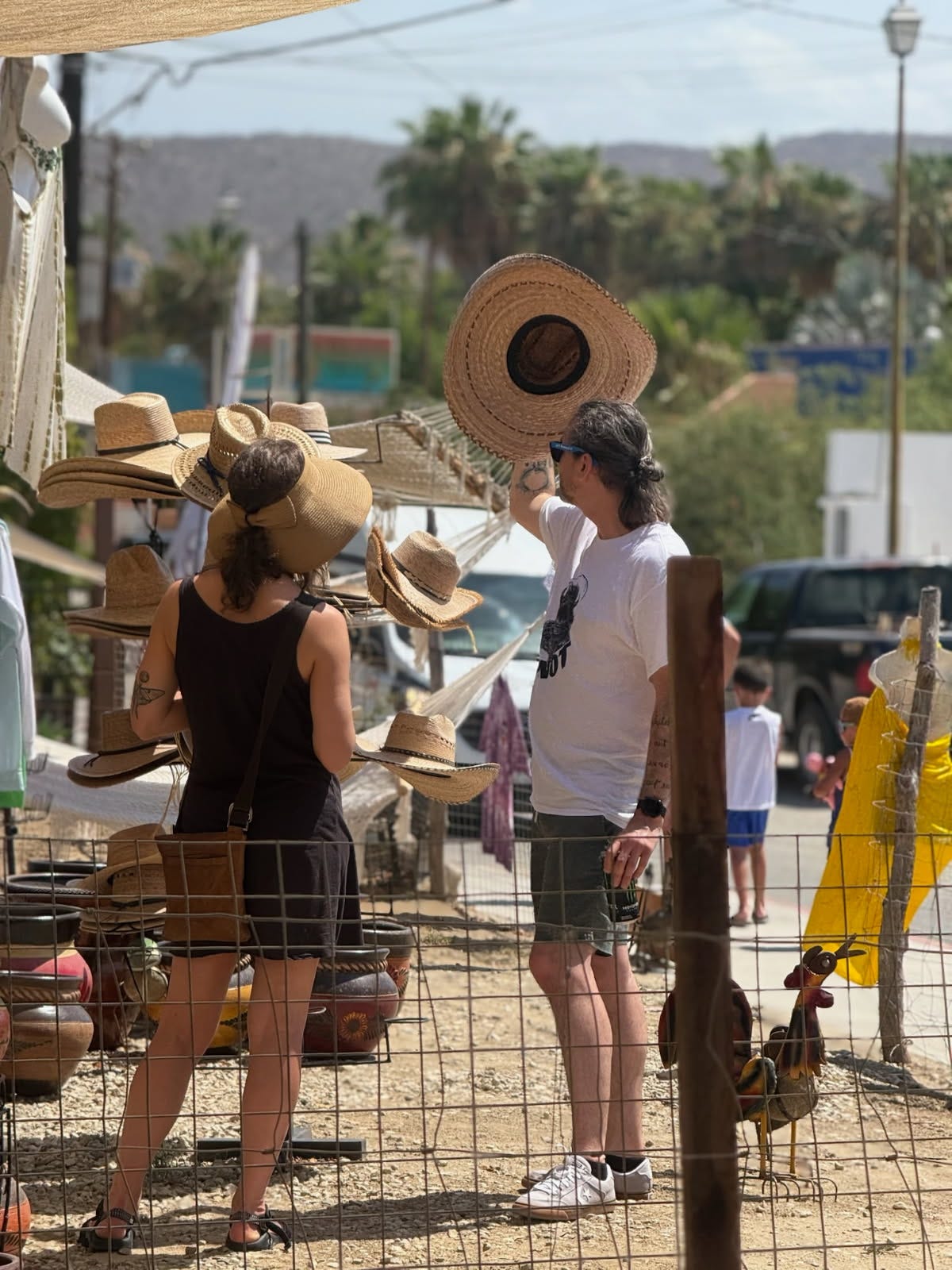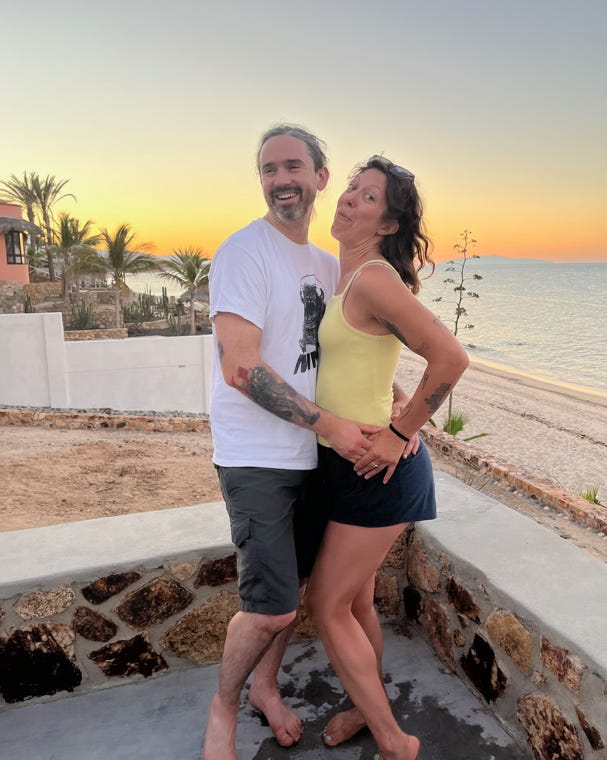Forgive me — I just got back from what was simultaneously the most relaxing and exciting vacation and I am just getting re-accustomed to the real world, so my brain is a little squishy. It took two full years to coordinate schedules, finances, and logistics in order to travel out of the country with my entire family, including four young kids, but it was worth every cent and ounce of effort. Eight days in a giant beachside house in Los Barriles, Mexico that included fishing for (and eating!) snapper, bombing around the desert in an ATV, snorkeling in the ocean (and getting stung by a jellyfish), spending nearly the entire time in a bathing suit, eating and drinking to my heart’s delight, immersed in salt water until I was as brined as a pickle. I didn’t turn on my phone, look at my watch, or put on makeup while I was there and I wish I could give up all of them forever. Being disconnected from all the real world bullshit allowed me to feel truly present on this trip, in my body, in my environment, and surrounded by my kids, my family, and my partner. Nothing else mattered. I recognize how much of a privilege that is and I don’t take it for granted at all.
Anyway, here’s some pics (that someone else took because I could not possibly be bothered to take a photo) (and yes there exists plenty of pictures of my kids, just not here):

Recommended Reading
Retrieval by Emily Adrian in Granta
One of my favorite premises of a story is when the complications of a random relationship are explored, where there is intensity of an unexpected connection between two people who should be inconsequential to each other. “Retrieval” hinges entirely on this type of relationship — that of the narrator (Lillian) and the brother (Cameron) of her ex-boyfriend (Lucas), with whom she’s been desperately and fruitlessly in love with for the better part of two decades. This particular dynamic is not explained right away. Adrian parses it out carefully within the first scene of the story, in which Lillian is having dinner with Cameron and his wife, Stephanie (side note — the characterization here is brilliant: Stephanie wore a chambray shirt and her short hair in stubby braids. She had permanent podcast voice….Stephanie was Brooklyn-intrigued, fertility discourse her jam. Can you not just see this person exactly?). Cameron answers questions asked to Lillian, she is impressed he remembers her dissertation topic, he references Lillian’s beauty in front of his wife, etc., giving clues to the nature of their connection before it is radically revealed through the mention of Lucas, expertly hinging on the use of the world “sibling”. Once we understand the connection between these two men, their triangulation with Lillian is thrown into focus, and we can see how massively the complications of this dynamic have affected her for so many years: I understood my isolation at thirty-five as a meandering, indirect result of how I’d treated Lucas in high school. Every man I’d been with since was tainted by the same second-bestness, that quality of near-perfection I’d inflicted on my first boyfriend.
But love isn’t really the driving force here. Lillian’s motivation is not necessarily to woo Cameron into falling for her — that would be disappointingly simple. Rather, as in any smartly written short story, we are given everything we need to know about Lillian’s motivations and the main conflict of this story in the first paragraph, a fact we might not realize until we have read the entire thing: My mother had died in a terrible accident and if I neglected to have a child someday soon-ish I would never again know real, abiding love. Cameron and I were in touch intermittently, saw each other every few years, and on the fourth of September I started my period and gave him a call. He and his carpenter wife Stephanie welcomed me into their home exactly two weeks later. TL:DR — dead mom. Needs to get knocked up. Times cycle accordingly. Of course, the undercurrent of this motivation is that while she is freezing her eggs, wanting to seemingly reproduce sans man, she also wants Cameron to impregnate her. She knows what she’d rather do, but she also wants to hedge her bets. The magnitude of these desires, tangled up with her complicated connection to Cameron, manifests in a ballsy move: low-key asking him to come have sex with her at her hotel, which he gently, albeit swiftly, turns down. In a way, his gentle rebuff makes it clear that this push-pull, tempt-rebuff pattern has been par for the course for a very long time.
After Plan A fails, Lillian undertakes Plan B: go through with the egg retrieval process (posterity: check), then reach out to Lucas, which to me sounds like a classic case of settling: My precise goals were obscure to me, or maybe not obscure but absurd: I wanted to get back together with Lucas, or I wanted to apologize, sincerely, for ever having been with him. Maybe both. The author nails the palpable awkwardness of their conversation at the bar, the layers of their history and motivations and knowledge of Cameron’s role in all of it building up into Lucas revealing his distaste for “the whole test tube baby thing”: ‘I just think, like, if I ever have children, I want them conceived the old-fashioned way. Two people fucking in love, in a bed. Exchanging their actual bodily fluids, you know?’ There is no way, considering his knowledge of her experience and desires, to see this statement as anything other than condescension and abject cruelty on his part. Is he trying to exact some sort of revenge for how she abandoned him in high school? The staying power of their feelings for one another (Lillian, Cameron, and Lucas) is astounding.
Adrian does something interesting at the end of the story by suddenly speeding up the pacing in the penultimate paragraph, rapidly and succinctly describing Lillian’s eventual pregnancy, resultant daughter, and the unpredictable relationship the two would have — perhaps a reflection of the gaping loss of her own mother. I think that this comprehension shows that despite the enormity of pregnancy and birth, the leadup to it — the complications, the work, the nuance and complexity of gathering up enough self-love and luck and pure ballsiness to actually go through with it — was the consequential part, the part with the most lasting effects. The distillation of this story’s entire complicated conflict is delivered in the second-to-last sentence, the thesis statement for Lillian’s entire journey: I am forever torn between spontaneity and all my careful plans.
(Emily Adrian’s book Seduction Theory is out in August! Smash that preorder!)
What I’m Consuming
The phrase “hates to see me coming”
I don’t know why, but I will often latch on to a certain silly little phrase and then overuse it right into the ground only to adopt another one in its wake. Finally, I can comfortably retire “dope” in favor of “hates to see me coming.” A gas station snack? Hates to see me coming. An iced coffee at 2pm? Hates to see me coming. A pair of pajama shorts worn as regular daytime shorts? Hates to see me coming. Maybe I should just rename this section of the newsletter “Hates to See Me Coming.”
Gas station snacks
Speaking of, I have finally decided to accept my love for gas station snacks. I do a lot of driving on a regular basis, and there’s nothing that assuages the slog of a long two-lane highway drive like a 48oz Diet Coke, a bag of Smart Pop, some Haribo gummy bears, and maybe wasabi-flavored almonds if I need some protein. Yes, I know gas stations aren’t traditionally bastions of health. Yes, I know they are overpriced. And yes, the backseat of my car is a snack-wrapper graveyard. But you know what? A gas station snack HATES to see me coming.
Prompt
Write from the perspective of a seasonal summer employee working somewhere remote and away from home for the summer. Examples: wildland firefighter, tour guide, nanny/au pair, camp counselor, etc. Come up with a specific complication or difficulty associated with this type of work, particularly with the fact of its temporary nature, isolation, or unfamiliarity. Write a scene in which the character is “off duty”, yet still in the setting of their seasonal employment, and is actively navigating this issue.
Writing Update & Excerpt
After taking a week off of writing anything while I was in Mexico, I jumped right back in this week. I am THISCLOSE to finishing a draft of “Halloween in Buffalo” and sketched out a rough outline for how I want to finish “Nosebleeds” (titles likely temporary). In working on a scene in the former today that I’ve been putting off because I wasn’t sure how to navigate it, I had this feeling I haven’t felt in a long time: the urge to just push through it. I felt myself speaking the words in my head — just push through it. I have a sticky note above my desk that says, “Stay in it,” a similar reminder to just hold on. Don’t lose your grip on the scene. Just keep writing. I’ve been guilty, especially lately, of letting go when it gets hard, of allowing myself a little distractive break when the words aren’t coming easily, or just giving up completely (the first nearly always turns into the second). It felt invigorating today to maintain my hold and write through the difficult parts, and my word count for today showed for it.
Something I’ve also been doing over summer break thus far is keeping an accountability spreadsheet, an idea I picked from the Chelsea Hodson’s Morning Writing Club. It may sound inconsequential, but filling out a row for the day’s writing session gives me the same satisfaction as checking something off a to-do list and keeping a record of my writing habits has been a motivator to continue lengthening the log. Highly recommend.
Anyway, here’s a chunk of recently written material from “Halloween in Buffalo”:
It’s Halloween in Buffalo and Rosie the Riveter — who told me her name at some point but will forever be solidified as Rosie in my swiss-cheese memory — is leading me by the hand to the fire escape to smoke a cigarette. “Weed’s fine inside, but nothing will lose your security deposit faster than cigarette smoke,” she tells me. Fine by me — I’m higher than a fucking kite and her fingers wrapped around mine, pressing the knuckles together, feels lovely. It’s freezing outside but she doesn’t seem to notice the erections of a million adorable little goosebumps up and down her arms, or how I can barely keep from grazing my fingers over them.
As she passes me a cigarette, she asks me what I do, why I’m here, as in Buffalo and not just this random party in this dilapidated building. I feel loose and safe, so I tell her about Erin and Toronto, about the Canadian government’s disdain with my criminal record that landed me in this city, about the intensity of Erin’s program and the long stretches of silence when she became one with her painting, about Mateo and my burgeoning jealousy over the proliferation of Erin’s rich life without me. I dance around the fact of my resentment, giving my words the flavor of it without driving a steak knife directly through it. Rosie listens intently, silently, sustaining her direct gaze, her lips twitching every few moments as they itch for a cigarette. She doesn’t even appear to be listening, but I can tell that she is taking me in wholly, turning me over in her brain, tounging my every word in her own mouth. Or at least, I hope she is. Even the idea of her attention is like quenching a thirst, and innoculates me with openness.
“What about you?” I ask after dominating the conversation for far too long. “I want to know you.”
She scoots closer to me, our backs pressed against the fire escape railing, the entire length of our thighs making contact. She tells me she’s a paramedic, drives around all day in an ambulance rescuing people from often preventable accidents, teaches CPR certification courses. I can’t stop myself from picturing her bouncing atop one of those plastic dummies, the dark cleft between her breasts like an endless, swallowing void. She tells me how she’s always wanted to be a doctor, a surgeon, ever since she had open-heart surgery as a small child to repair a congenitally faulty valve. She pops open the top button of her shirt and shows me her scar, a thick purple zipper up the center of her sternum, with little splotches of new skin like tiny fireworks around the border. I reach up and touch a finger to it, feel the taut lumpy skin, barely any give to it. It feels hotter than the rest of her, like all the energy of her heart is trying to escape through it.
“You…you smell amazing,” I say. “Like, fruit or something.”
Her soft giggle is like an irresistible tinkle of a bell. “You wouldn’t believe it, but it’s just this cheap body lotion from Walgreens.” She sets her hand on top of mine and leans forward. “Blue raspberry or something like that.”
Blue raspberry.
I pull back, pull my hand away.
Thank you for sticking with me for another week! Stay well and as joyful as you can.
xoxo,
brit














